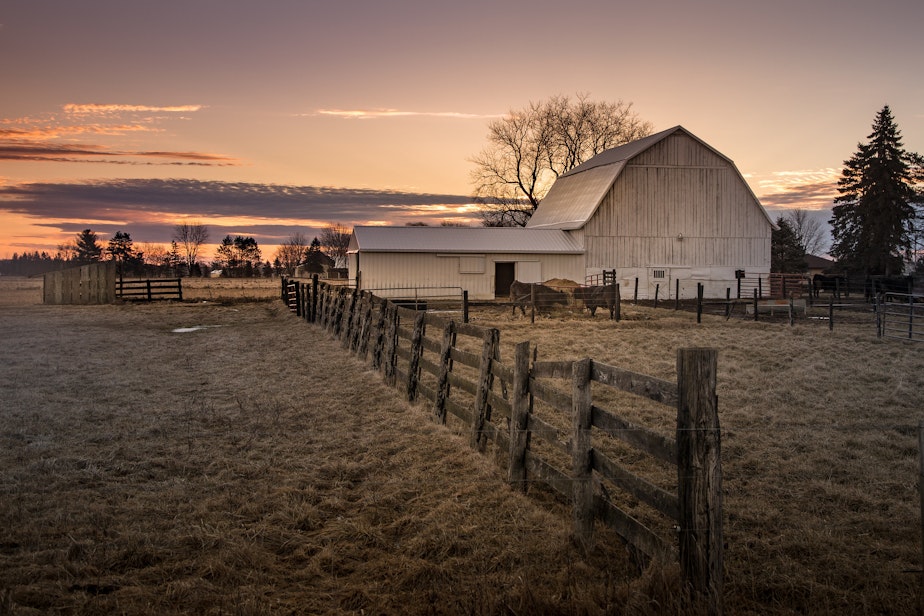The unique mental health challenges facing farmers and farmworkers

There are many barriers to receiving mental health care. It’s expensive, not always covered by insurance, and it can be difficult to find a therapist. A new report from the Seattle Times says those barriers can be even higher for people working in agriculture.
"I'm amazed that the amount of suicides in my own community and the ag community that I wasn't aware of," says Don McMoran, director of Washington State University’s Skagit Extension office.
With funding from Washington’s Department of Health and the U.S. Department of Agriculture, McMoran has started a suicide prevention program specifically focused on farmers and farmworkers.
That includes attending educational workshops, where the program can hand out promotional materials and connect with farmers, "letting farmers know that their occupation is stressful," McMoran explains.
And McMoran isn’t just giving presentations. He’s creating spaces where farmers and farmworkers can meet, like an event held by the Skagit Extension and WSU’s bread lab called "Pizza for Producers."
"The idea behind it is getting farmers together so that they can communicate," McMoran says. "We're trying to kind of rebuild community in these rural areas, a lot of it has has really been struck hard especially by Covid as people were isolating and that's had an even more devastating effect on mental health."
Sponsored
A new report from the Seattle Times says agricultural workers face unique challenges that have been exacerbated by the pandemic.
"It's generational," says Michelle Baruchman, the Times’ Mental Health Project engagement reporter. "So, their parents did it, their grandparents did it, all the way up to, you know, the first settlers in the United States."
That means there can be an extra sense of responsibility with farmers, with the weight of their lineage on their shoulders.
"It's also part of their identity," Baruchman says. "This kind of work is not a 9 to 5 office job. It's something that they do, in many cases, 365 days a year, through all kinds of weather conditions. And then that becomes part of who they are. And so it's difficult for them to separate their jobs from from their fundamental personalities and beings."
Barriers for mental health care with farmers and farmworkers can include not being able to find providers in their area, or not being able to get on the schedule for doctors that are serving their location.
Sponsored
There's also a lot of stigma around receiving treatment.
"It's both this lack of ability to find someone, and then also cultural norms around this idea that you should be able to help yourself," Baruchman says. "That you work on your land every single day, you produce food for yourself, you should be able to help yourself with your own mental health struggles, and you shouldn't need outside support."
Baruchman notes there is a difference in the support needed for farmers compared to farmworkers.
"Whereas the farmers could benefit from mental health providers that understand the agrarian lifestyle, farmworkers could benefit from mental health providers that not only understand the agrarian lifestyle, but also have proficiency in languages that they speak, Spanish and also Native languages," Baruchman explains.
There's also a need to understand farmworkers' culture and their lifestyle.
Sponsored
Don McMoran, director of Washington State University’s Skagit Extension office, says there are also more resources becoming available.
"We have a private funder that's also very interested in this subject, and they've donated funding so that we can work with the WSU psych clinic over in Pullman,"McMoran says. "And we can actually give out vouchers, so free coupons to farmers and farmworkers, so that they can actually sit down and chat with a medical provider about their mental health."
Baruchman says that more than anything, what stood out to her while reporting this story is how hard agricultural work is.
"People are really working, not just through bad weather conditions, but also through Covid," Baruchman says. "Also, women experience some of the highest rates of sexual assault in these jobs."
But Baruchman notes that this is also a career people take a lot of pride in. The push to recognize and openly talk about mental health needs is making the community stronger.
Sponsored
"There is a new wave of recognition of these stressors," Baruchman says, "that it doesn't make you weaker to talk about them, it makes you stronger, and it makes you a leader in your community to be able to share your stories and make them feel like other people in the community can feel."





